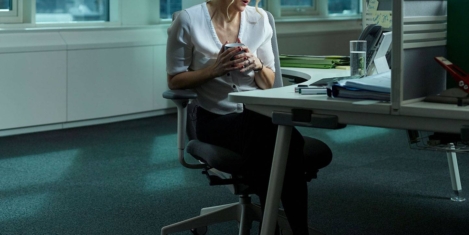To provide the best experiences, we use technologies like cookies to store and/or access device information. Consenting to these technologies will allow us to process data such as browsing behaviour or unique IDs on this site. Not consenting or withdrawing consent, may adversely affect certain features and functions.
The technical storage or access is strictly necessary for the legitimate purpose of enabling the use of a specific service explicitly requested by the subscriber or user, or for the sole purpose of carrying out the transmission of a communication over an electronic communications network.
The technical storage or access is necessary for the legitimate purpose of storing preferences that are not requested by the subscriber or user.
The technical storage or access that is used exclusively for statistical purposes.
The technical storage or access that is used exclusively for anonymous statistical purposes. Without a subpoena, voluntary compliance on the part of your Internet Service Provider, or additional records from a third party, information stored or retrieved for this purpose alone cannot usually be used to identify you.
The technical storage or access is required to create user profiles to send advertising, or to track the user on a website or across several websites for similar marketing purposes.
 Whether you’re a morning person or love burning the midnight oil, we’re all controlled by so-called body clocks. These body clocks (which regulate your circadian rhythms) are inside almost every cell in the body and control when we feel awake and tired during a 24-hour period. But as it turns out, our latest study found that our body clocks have a much bigger impact on us than we previously realised. In fact, our body clocks actually effect how well a person performs on both mental and physical tasks.
Whether you’re a morning person or love burning the midnight oil, we’re all controlled by so-called body clocks. These body clocks (which regulate your circadian rhythms) are inside almost every cell in the body and control when we feel awake and tired during a 24-hour period. But as it turns out, our latest study found that our body clocks have a much bigger impact on us than we previously realised. In fact, our body clocks actually effect how well a person performs on both mental and physical tasks.







 Almost half (49 percent) of UK employees admit they speak to colleagues about health concerns before sharing it with a partner or loved one, claims new research by Bupa Health Clinics. Stress, sleep, anxiety and weight problems are among the main concerns being discussed by employees at work, before confiding in those closest to home. The new report found that 46 percent of employees prefer to talk about health with a colleague over a loved one. Many do so with good intentions with more than a third finding it easier to talk to a colleague as they are less likely to worry.
Almost half (49 percent) of UK employees admit they speak to colleagues about health concerns before sharing it with a partner or loved one, claims new research by Bupa Health Clinics. Stress, sleep, anxiety and weight problems are among the main concerns being discussed by employees at work, before confiding in those closest to home. The new report found that 46 percent of employees prefer to talk about health with a colleague over a loved one. Many do so with good intentions with more than a third finding it easier to talk to a colleague as they are less likely to worry.


 Business leaders have called today for the Government to update health and safety legislation to protect mental health in the workplace. In an
Business leaders have called today for the Government to update health and safety legislation to protect mental health in the workplace. In an 
 Figures from Macmillan show that almost 900,000 people of working age (16-64) are living with cancer – a figure expected to rise to over a million by 2030, while the HSE disclosed 600,000 workers needed time off in the past year due to suffering from work-related stress, depression or anxiety. Men are notoriously bad at checking their health but according to Bupa an increasing spotlight on issues such as prostate cancer and testicular cancer earlier this year led to an increase in male health assessment bookings. In March 2018, Bupa saw a 28 percent uplift in male health assessment bookings compared to the same time last year, and a 43 percent year-on-year increase in April 2018. But according to the healthcare provider, employers must more efforts to help create a culture where male workers can open up about mental or physical problems.
Figures from Macmillan show that almost 900,000 people of working age (16-64) are living with cancer – a figure expected to rise to over a million by 2030, while the HSE disclosed 600,000 workers needed time off in the past year due to suffering from work-related stress, depression or anxiety. Men are notoriously bad at checking their health but according to Bupa an increasing spotlight on issues such as prostate cancer and testicular cancer earlier this year led to an increase in male health assessment bookings. In March 2018, Bupa saw a 28 percent uplift in male health assessment bookings compared to the same time last year, and a 43 percent year-on-year increase in April 2018. But according to the healthcare provider, employers must more efforts to help create a culture where male workers can open up about mental or physical problems.










 One in four working people aged 55+ with a health condition are considering leaving work as a negative culture and bureaucratic procedures put many off speaking to their employers until a crisis point. This is according to a new report from Ageing Better, ‘Health warning for employers: supporting older workers with health conditions’, which claims that employers are not properly supporting older workers experiencing long-term physical and mental health conditions. Health is the most important factor affecting older workers’ decisions to stop working before reaching State Pension age. Ageing Better’s research finds that early access to support, small adjustments to the workplace and working patterns, and empathetic management are crucial to enabling people to manage their health at work and remain in employment. But the research also found that workers are often put off speaking to employers until the last moment due to poor workplace culture and overly bureaucratic procedures.
One in four working people aged 55+ with a health condition are considering leaving work as a negative culture and bureaucratic procedures put many off speaking to their employers until a crisis point. This is according to a new report from Ageing Better, ‘Health warning for employers: supporting older workers with health conditions’, which claims that employers are not properly supporting older workers experiencing long-term physical and mental health conditions. Health is the most important factor affecting older workers’ decisions to stop working before reaching State Pension age. Ageing Better’s research finds that early access to support, small adjustments to the workplace and working patterns, and empathetic management are crucial to enabling people to manage their health at work and remain in employment. But the research also found that workers are often put off speaking to employers until the last moment due to poor workplace culture and overly bureaucratic procedures.
 More than half of working adults believe that UK businesses are not doing enough to support the physical and mental wellbeing of their employees. The vast majority (86 percent) believe that firms are specifically not doing enough to help employees deal with work-related stress, anxiety and other mental health issues. And with seven out of 10 of those surveyed by
More than half of working adults believe that UK businesses are not doing enough to support the physical and mental wellbeing of their employees. The vast majority (86 percent) believe that firms are specifically not doing enough to help employees deal with work-related stress, anxiety and other mental health issues. And with seven out of 10 of those surveyed by 







